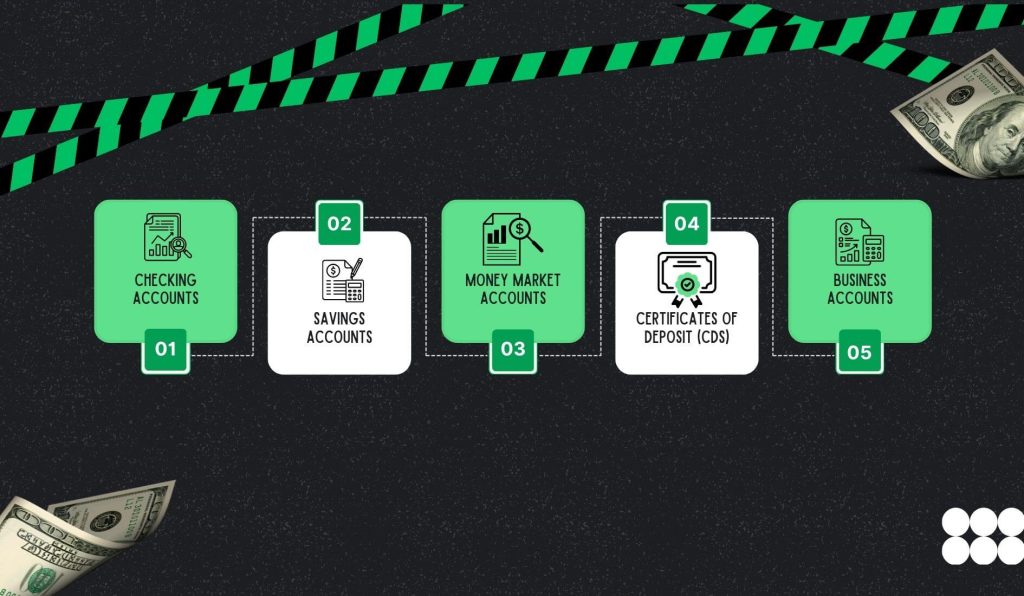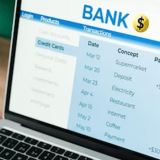- Types of Bank Accounts
- 1. Checking Accounts
- 2. Savings Accounts
- 3. Money Market Accounts
- 4. Certificates of Deposit (CDs)
- 5. Business Accounts
- Choosing the Right Bank Account for Your Needs
- Step 1: Assessing Financial Goals
- Step 2: Comparing Features
- Step 3: Long-Term Considerations
- Expert Tips for Managing Your Bank Accounts
- 1. Always Monitor Your Bank Account Regularly
- 2. Try to Automate Your Savings
- 3. Start Working with Online Tools
- Use Bank Account As a Tool
- Frequently Asked Questions (FAQs)
Understanding Different Types of Bank Accounts and Their Uses

When it comes to money, managing it is not exactly thrilling. Still, it is necessary. However, it starts by choosing the right types of bank account. Depending on your requirements, selecting the right bank account is essential. In fact, the account you pick should match your financial terrain.
Why does choosing the right bank account matter? This is because different accounts do different jobs. While some are built for spending, others are for saving. Meanwhile, some help you to grow your money slowly, while others are for locking it away.
Hence, if you are trying to get a grip on your finances, understanding the types of bank accounts available is step one.
Types of Bank Accounts

The following are the types of bank account options you must know if you want to manage your finances:
1. Checking Accounts
This one is the workhorse among bank accounts. Basically, if you want an everyday go-to account, choose a checking account. It is easy to get paid, spend, and pay bills all through this account. In fact, it is like your financial front door.
| Purpose | Daily transactions. Groceries, rent, subscriptions, coffee runs, etc. |
| Features | Debit card access, checks (if you still use those), online banking, and mobile apps. Also, they are fast and flexible. |
| Variations | Traditional. Just basic access. Interest–bearing. Earn a little while you spend. Premium. Perks like waived fees and better support. Student. Tailored for college life. That is fewer fees and easier access. |
However, not all checking accounts are created equal. For instance, some charge fees if your balance dips. Meanwhile, others reward you for keeping money in. Hence, make sure to always read the fine print.
2. Savings Accounts
This one is for the “future you.” It is best if you want to travel, buy a car, or just have a safety net. The following are some of the essential details of a savings account:
| Purpose | Save money and let it sit and grow. |
| Features | Limited withdrawals Encourages discipline Interest builds slowly. |
| Variations | Traditional: Basic savings. High-yield: Better interest rates (usually online banks). Online: No branches, but mostly better returns. |
While you choose a savings account, do not treat it like a checking account. This is because there are limits on how often you can dip into it. In fact, that is actually the point of a savings account.
3. Money Market Accounts
This one is a bit of a hybrid. Think of an account with the benefits of a checking account and a savings account, but with a twist.
| Purpose | Earn interest, but still access your money. |
| Features | Limited check-writing Debit card access Higher interest than regular savings. |
| Considerations | • Higher minimum balances. • Limited transactions. • Mostly better for people with a bit more cash to park. |
At the outset, a money market account is like a savings account but comes with additional benefits. However, the benefits are significant only if you play by the rules.
4. Certificates of Deposit (CDs)
Certificates of Deposit (CDs) are what you lock in and then forget about them. All you have to do then is watch it grow.
| Purpose | Long-term savings Fixed interest Fixed term |
| Features | • Higher interest than savings. • Penalties if you withdraw early. • Terms range from a few months to several years. |
| Considerations | • Not flexible. • Best if you won’t need the money soon. |
In general, CDs are for planners. If you have enough money, you will not have to touch your account money for a while. This is how you plan to grow your money.
5. Business Accounts
If you want to run a business, you need separate accounts. In fact, it is not advisable to mix personal and business funds.
| Purpose | Handle business transactions Track expenses Pay employees. |
| Features | • Business checking and savings. • Merchant services. • Payroll tools. |
| Considerations | • May require documentation (licenses, EIN, etc.). • Higher fees. • More complex features. |
Meanwhile, if you freelance, side hustle, or run a full-blown company, having a business account is non-negotiable.
Choosing the Right Bank Account for Your Needs

There is no one-size-fits-all bank account. Hence, you have to select the right one depending on your needs. The following are the steps you must follow if you want to choose the right bank account for your daily requirements:
Step 1: Assessing Financial Goals
If you are looking for daily access, you must go for a checking account. Meanwhile, if you are saving for a trip, try a high-yield savings account. However, if you want to grow money untouched, a CD account or a money market account is a better option.
Step 2: Comparing Features
First, look at interest rates. Then, watch out for factors like fees and minimum balance requirements. Moreover, ensure that your money is easy to access.
Step 3: Long-Term Considerations
If you are thinking long-term, ask yourself the following questions:
- Will your needs change in a year?
- Are you planning a big purchase?
- Do you want to build credit or invest later?
Essentially, if you think ahead, your future self will thank you.
Expert Tips for Managing Your Bank Accounts

After you get your bank account, you will have to do the following to manage your bank account:
1. Always Monitor Your Bank Account Regularly
After you have started using your bank account, make sure to check your balances from time to time. Also, if you spot fraud, immediately reach out to the bank. Moreover, always avoid overdraft fees.
2. Try to Automate Your Savings
First, you must set up auto-transfers. This way, even $10 a week adds up, which is beneficial if you want to save for the long term. Hence, if your situation is “out of sight, out of mind”, your savings will still grow.
3. Start Working with Online Tools
There are many apps available that help you manage your account better. For instance, budgeting apps help you against impulse spending. Moreover, set up alerts for low balances.
Also, for easy deposit, ensure that you allow mobile deposits on your account. Meanwhile, real-time tracking also helps you track your account balance and transactions anytime.
Use Bank Account As a Tool
Bank accounts are not merely places to stash cash. Rather, they are tools to grow your finances. In fact, each type of account serves a purpose. This holds whether you are spending, saving, growing your finances, or managing them.
Hence, it is important to get a better idea of the types of bank account options available. This helps you make smarter choices. Also, smarter choices lead to better financial health. Therefore, take a minute and think about what you need. Then pick the account that fits your requirements.
Frequently Asked Questions (FAQs)
The following are some of the questions that we get regarding types of bank account options:
While checking accounts are for spending, savings accounts are for storing. The former is active and the latter is passive.
A high-yield savings account comes with better interest rates. In general, they are usually offered by online banks.
Yes, money market accounts mostly come with fees. Also, you will have to pay fees if you don’t meet the minimum balance. Hence, make sure always to read the terms.
If you do not need the money soon, go for a Certificate of Deposit (CD) account. However, if you want flexibility, stick with savings.
Of course, it is possible to have multiple types of bank accounts (many people do). However, make sure you are managing them well.











